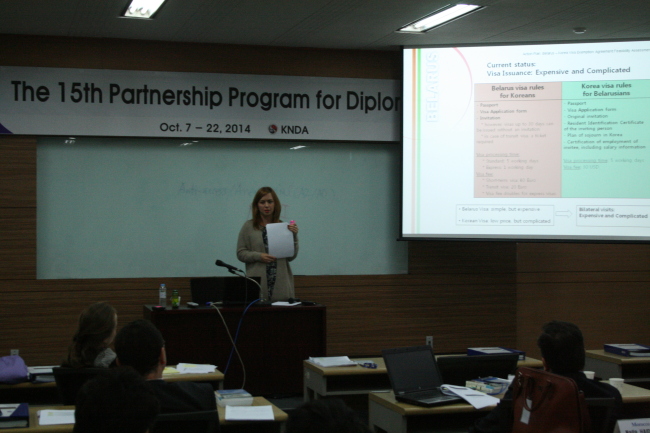Developing countries explore ways to boost Korea ties
By Shin Hyon-heePublished : Oct. 22, 2014 - 20:01
DAEJEON/SEOUL ― Nineteen diplomats from 13 developing countries on Wednesday vowed to help bolster relations between Korea and their homelands by boosting people-to-people exchanges, knowledge sharing and other political, business and cultural partnerships.
Wrapping up a two-week training program run by the Korea National Diplomatic Academy, they presented possible “action plans” to expand bilateral cooperation at the institute’s Seoul headquarters. The participants were from Bangladesh, Belarus, Cambodia, Egypt, Jordan, Kenya, Laos, Morocco, South Africa, Tajikistan, East Timor, Venezuela and Yemen.
Among the proposals are a joint committee on trade, investment and technical cooperation, trade fairs, language courses provided by diplomatic institutes, a visa exemption pact and cultural centers. Many ideas are designed to deepen economic ties and take a page out of Korea’s development book.
“We always look for answers to improve,” said Maria Da Conceicao Rodrigues De Freitas, deputy director for Asia and the Middle East at South Africa’s Department of International Relations and Cooperation, picking as a model case the Saemaul Movement, an agricultural and rural reform campaign here in the 1970-80s.
Wrapping up a two-week training program run by the Korea National Diplomatic Academy, they presented possible “action plans” to expand bilateral cooperation at the institute’s Seoul headquarters. The participants were from Bangladesh, Belarus, Cambodia, Egypt, Jordan, Kenya, Laos, Morocco, South Africa, Tajikistan, East Timor, Venezuela and Yemen.
Among the proposals are a joint committee on trade, investment and technical cooperation, trade fairs, language courses provided by diplomatic institutes, a visa exemption pact and cultural centers. Many ideas are designed to deepen economic ties and take a page out of Korea’s development book.
“We always look for answers to improve,” said Maria Da Conceicao Rodrigues De Freitas, deputy director for Asia and the Middle East at South Africa’s Department of International Relations and Cooperation, picking as a model case the Saemaul Movement, an agricultural and rural reform campaign here in the 1970-80s.

In her presentation, she floated a three-year plan aimed at shoring up agriculture and the overall rural economy through pilot community reform projects.
“The objectives are to generate equitable access and participation in a globally competitive, profitable and sustainable agricultural sector contributing to a better life for all,” she said.
Yulia Ilyina and Lyubov Mayorova, young diplomats from Belarus, raised the need for a visa exemption accord with Korea.
Though currently no visas are required for diplomatic and official passports, a broader agreement is key to catering to the soaring number of Korean tourists, students and businesspeople, they noted.
“All countries around Belarus provide a visa-free regime for Korean nationals,” they said in their presentation, adding the number of visitors between the two nations is rising 15 to 20 percent annually.
“Visa is a stumbling block for practical cooperation.”
The KNDA launched the annual course in 2000, consigned by the Korea International Cooperation Agency. More than 300 officials from developing countries around the globe have so far taken part, the academy said.
The program includes briefings and lectures by senior Seoul officials and scholars on Korea’s history, foreign, economic and development assistance policy, the situation on the peninsula and other subjects. The participants have also visited major political, industrial and cultural destinations, as well as think tanks.
Last week, they traveled to Daejeon to tour the Daedeok science town and the Electronics and Telecommunications Research Institute, the country’s top think tank on information and communications technology.
“The diplomats also had opportunities to introduce the politics, economy and culture of their own native countries to promote friendship and mutual understanding,” said Park Sun-tae, director for career training at the KNDA.
“During the program, they would find systems that are in operation here but may work back home and present them along with cooperative mechanisms with Korea at the end.”
By Shin Hyon-hee (heeshin@heraldcorp.com)



![[Herald Interview] 'Amid aging population, Korea to invite more young professionals from overseas'](http://res.heraldm.com/phpwas/restmb_idxmake.php?idx=644&simg=/content/image/2024/04/24/20240424050844_0.jpg&u=20240424200058)












![[KH Explains] Korean shipbuilding stocks rally: Real growth or bubble?](http://res.heraldm.com/phpwas/restmb_idxmake.php?idx=652&simg=/content/image/2024/04/25/20240425050656_0.jpg&u=)

